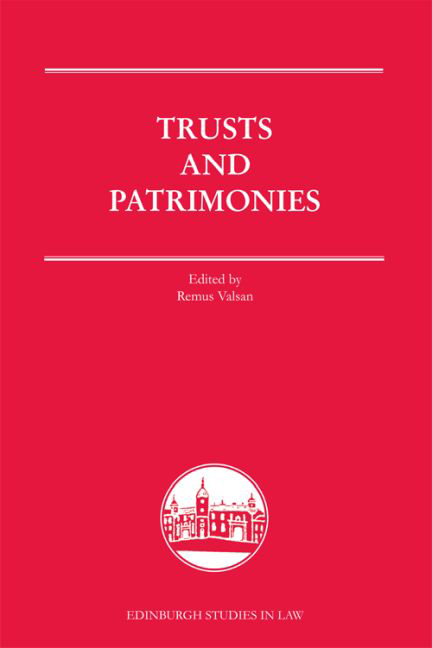Book contents
- Frontmatter
- Contents
- Preface and Acknowledgements
- List of Contributors
- List of Abbreviations
- Table of Cases
- INTRODUCTION
- PART I PATRIMONY AND THE COMMON LAW TRUST
- 2 Lepaulle Appropriated
- 3 Trust and Patrimony
- 4 Square Peg, Round Hole? Patrimony and the Common Law Trust
- PART II PATRIMONY AND THE SCOTTISH TRUST
- PART III TRUST AND PATRIMONY IN FRANCE, QUEBEC AND THE NETHERLANDS
- Index
4 - Square Peg, Round Hole? Patrimony and the Common Law Trust
from PART I - PATRIMONY AND THE COMMON LAW TRUST
Published online by Cambridge University Press: 15 September 2017
- Frontmatter
- Contents
- Preface and Acknowledgements
- List of Contributors
- List of Abbreviations
- Table of Cases
- INTRODUCTION
- PART I PATRIMONY AND THE COMMON LAW TRUST
- 2 Lepaulle Appropriated
- 3 Trust and Patrimony
- 4 Square Peg, Round Hole? Patrimony and the Common Law Trust
- PART II PATRIMONY AND THE SCOTTISH TRUST
- PART III TRUST AND PATRIMONY IN FRANCE, QUEBEC AND THE NETHERLANDS
- Index
Summary
INTRODUCTION
The trust is a big problem for civil lawyers. Partly it is a problem for a good reason. But also for a bad one. The good reason is that the trust is a legal relationship that has to do with property rights, and the notion of property in the civil law is simply too different from that in the common law world to enable the trust to pass from one type of system to the other without both a comparative understanding of this significant difference and some suitable plan for coping with it. Both these things can be achieved, and the trust can be understood in the civil law, though at some cost, which lessens its attraction. I do not deal further with this issue in this paper.
The bad reason is the doctrine of patrimony, which is the subject of this paper. In broad terms, the notion of patrimony derives from the notion of personality. There is evidence that the doctrine of patrimony existed in Roman times, though it reached its full flowering only with the classic French nineteenth-century work of Aubry and Rau. They based their work on the earlier work of Zacharia, a German scholar writing on the Code Napoléon in force in the Rhineland. According to their theory, every person must have a patrimony, and only one. Not every civil code makes express provision for the patrimony. Although the German BGB and the Civil Code of Quebec do indeed mention it, the French Code of 1804 certainly did not, forcing Aubry and Rau to rationalise its existence from everything else that they found in the text of the code.
The theory of Aubry and Rau has been considerably criticised, and refined, by subsequent commentators, but so far as I know no mainstream civilian writer has gone so far as to say that there is no such thing as patrimony. It is, however, right to say that lawyers in other civil law jurisdictions (particularly the Germanic) would not regard their view of patrimony as necessarily the same as that of Aubry and Rau. I use it here because it is the most developed theory.
- Type
- Chapter
- Information
- Trusts and Patrimonies , pp. 62 - 84Publisher: Edinburgh University PressPrint publication year: 2015



